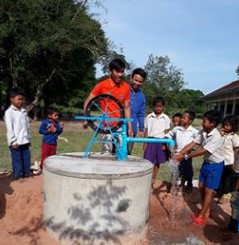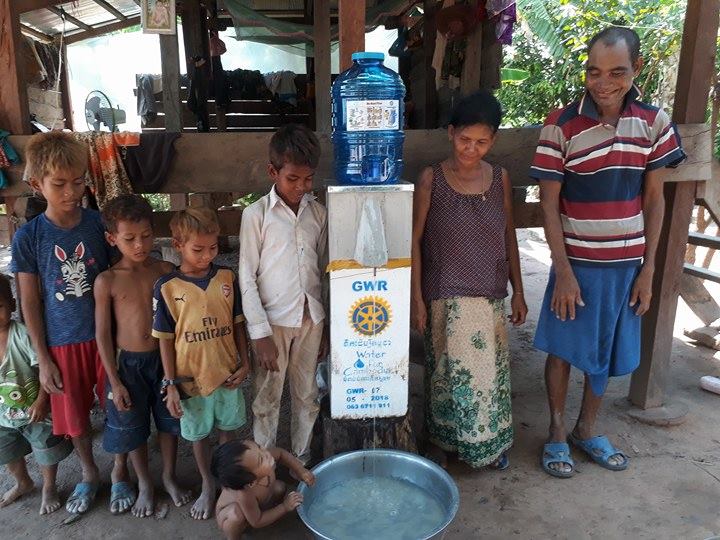A Holistic Approach to WASH in Cambodia.jpg)
.jpg)
After seeing how water and sanitation projects that are well-intentioned, but short-sighted can go wrong, the Rotary Club of Bath, Maine, under the leadership of Richard Cromwell, decided to introduce a comprehensive program to the villagers of Cambodia.
They built wells, coordinated the constructed latrines, provided water filters, and most importantly provided intense health and hygiene programs. Their project also has implemented a strong follow-up program to ensure sustainability.
A Holistic Approach
Getting Water Right --- Cambodia 2014-2018
By Richard Cromwell

Since 2010, I have ridden my bike across most of the countries in S.E. Asia. A roadside encounter with a young orphan boy introduced me to the distressing fate of orphans in Cambodia. I was hooked and have now made eight trips to Cambodia. Friends and neighbours have contributed to my efforts to improve the lives of Cambodian kids, and in 2013, the Bath Rotary Club and Rotary District 7780 funded my water and sanitation work at the Bridges Orphanage.
In 2014, District 7780 and the Bath Rotary sponsored my trip to five remote Cambodian villages to study the water and sanitation disaster, which has trapped the villagers in a cycle of poverty.
In the five Cambodian villages that our survey team visited, we found 105 uninstalled latrine kits. The cement rings, cover plates and porcelain squat toilets were strewn about villagers’ yards. Not one had been installed. The villagers had paid an NGO ‘roadshow’ the equivalent of a month’s earnings for the latrine components. They had received one community hygiene class which included installation instructions months before, but 89% of the villagers were still defecating in the open. What went wrong?
Our door-to-door ‘Knowledge, Attitude and Practices (KAP) Survey’ taught us:

- 99% of the 503 households in the five villages had no latrines;
- In the dry season, 86% of the villagers depend on polluted ponds and a polluted river for drinking water, and only 33% of the families treat that water. This bleak situation is exacerbated by poor hygiene practices and improper water storage techniques.
- There are shocking deficits in basic hygiene knowledge.
All the above leads to diarrhoea, urinary tract infections and gastrointestinal illness that cripples the villagers financially (due to the expense of and distance to medical clinics), causes the kids to miss school and adults to miss the little work available.
Addressing latrines is just one aspect of this troubling water, sanitation and hygiene disaster.
Our Rotary decided to use a holistic approach to address all aspects of the problem unlike the well-meaning, but shortsighted NGO mentioned above.
We decided on a holistic approach: drill and/or dig wells in each village; curtail open defecation by supplying latrine materials and promoting self-help installation from the villagers; install water filters in at least 70% of the households; and most importantly, we will educate through intense health and hygiene promotion.
Getting Water Right has included in our program not only pre-installation community and individual education but also ongoing follow-up for one year.
All households, latrines, wells, other water sources, and water filters will be registered to facilitate a contracted follow-up program. For instance, after one year, 30% of the facilities will be randomly selected and inspected.
Our holistic approach will end the cycle of poverty in this forgotten corner of Cambodia!
.jpg?_=636940544203325606)